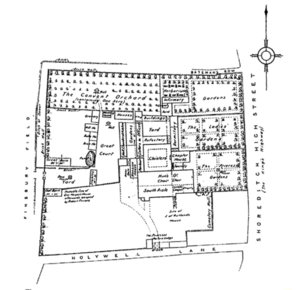Alice Hampton facts for kids
Quick facts for kids
Alice Hampton
|
|
|---|---|
| Born | 14?? |
| Died | 1516 |
| Nationality | Kingdom of England |
| Occupation | vowess |
| Known for | only single vowess |
| Relatives | Sir William Hampton (uncle) |
Alice Hampton (born sometime in the 1400s – died 1516) was a very rich English woman. She was known for being a "vowess" and for giving money to good causes. A vowess was a woman who made special religious promises, often to live a life devoted to God. Alice was special because she was the only known vowess who was never married. She became wealthy after her uncle, Sir William Hampton, passed away.
Contents
Alice's Early Life and Family
Alice Hampton was born in a town called Minchinhampton. Her parents were Ellen and John Hampton. She was one of eight children. It is believed she was the oldest daughter in her family.
Most of her brothers died when they were young. Her only surviving brother became a monk. This meant that Alice became the main heir for her father. She also inherited a lot of money from her uncle, who did not have any children of his own.
Becoming a Vowess
In 1483, Alice was staying at the Dominican Dartford Priory. This was a type of religious house for women. Her uncle, Sir William Hampton, died that year. He was a very important man. He had been knighted for helping to defend London. He was also a member of Parliament and had been the Lord Mayor of London. He made his money by selling fish. He even lent money to the King, Edward IV of England.
Alice became very rich after her uncle's death. It is thought that she decided to become a vowess because of her new wealth. Most vowesses were widows, meaning their husbands had died. Sometimes, married women became vowesses with their husband's permission. They promised to live a life of religious devotion. Vowesses followed church rules and were not under the same laws as other people. Alice was unique because she was not married when she became a vowess.
Life at Dartford Priory
The year after her uncle died, Alice was living in a small prayer room, called an oratory, near the priory. She became very sick because she was fasting too much. Fasting means going without food for religious reasons. A letter was sent to the Pope asking him to release her from her fasting promises.
On October 14, 1484, the Pope agreed. Alice was allowed to have her own confessor. This person could let her replace fasting with other religious duties. She was also allowed to attend church services in her own oratory. This gave her a lot of freedom to make her own choices. She also received a regular income of £15 per year from her inheritance.
Life at Holywell Priory
Alice inherited not only money but also her uncle's influence. By 1492, she was living in the suburbs of London. She moved to the Augustinian Holywell Priory in Shoreditch. Here, she paid the prioress, Elizabeth Prudde, four pounds of pepper each year.
In return for this payment, Alice had special privileges. She could use the priory's well and washing areas. She was also allowed to make changes to the buildings where she lived. She arranged her living space so she could see the church altar from her rooms. She also had a private, locked entrance to her own garden. Alice had her own exit from the priory and a special seat in the Lady Chapel. Her living space was two rooms, measuring about 18 feet by 10 feet.
 | Charles R. Drew |
 | Benjamin Banneker |
 | Jane C. Wright |
 | Roger Arliner Young |


